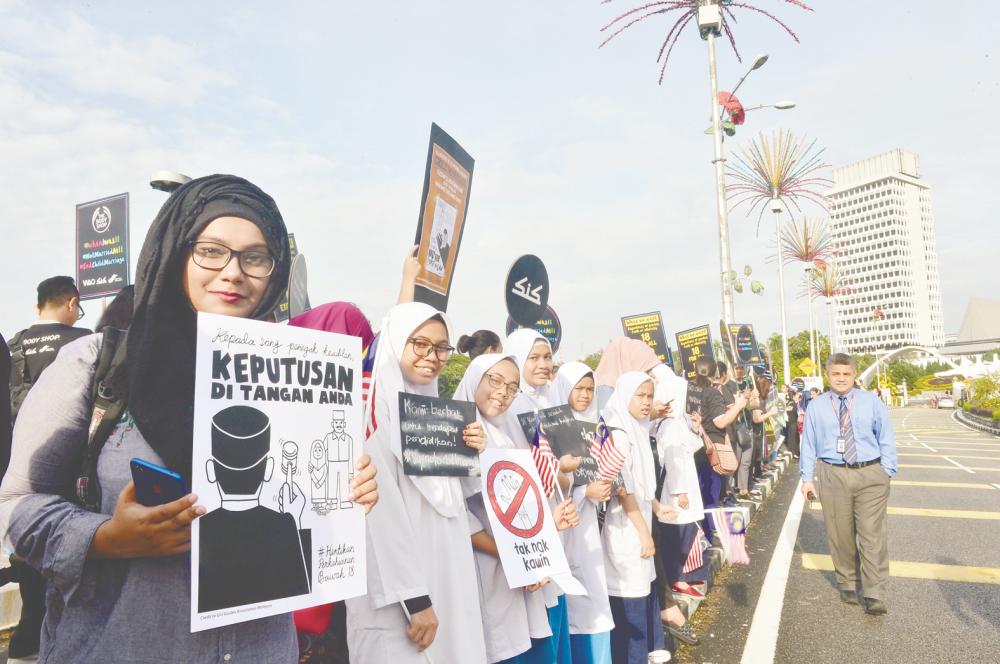PETALING JAYA: Over the years, Malaysians have expressed serious concerns over teenage pregnancies, child marriages and baby abandonments, but in the past five years over 44,263 teenagers got pregnant nationwide, including 17,646 who did so out of wedlock, said Sisters in Islam communications manager Ameena Siddiqi.
“Only Selangor and Kedah have raised the minimum marriage age for Muslim women to 18 years and while this seems like a step forward, the lack of action from other states to amend their laws allows the practice to continue.”
She said the federal government has repeatedly claimed that addressing child marriages is challenging and an uphill battle.
“Such statements are baffling and disheartening. They expose its lack of decisive action to protect vulnerable children,” she said, adding that the government launched a national strategic plan in 2020 to address the root causes of underage marriages, such as poverty, lack of education and harmful social norms.
However, she said little to no progress has been made to implement the plan and questioned the government’s commitment to addressing the issue.
Reports show a decline in the number of individuals under 18 years old entering marriage from 1,467 in 2019 to 1,035 in 2022.
The Women, Family and Community Development Ministry said Sarawak registered over 1,600 child marriages between 2017 and 2024.
“There is a shortage of comprehensive and transparent national data, making it difficult to fully comprehend and address the scale of child marriages in Malaysia,” said Ameena.
She said child marriages often force young girls to abandon their education, as proven in the Education Ministry’s Student Database Application System, which shows a rise in student dropout rates from 2019 to 2023, with marriage being a significant factor.
“Marriage is frequently seen as a solution to prevent children from becoming involved in romantic relationships and committing zina (fornication) or experiencing out-of-wedlock pregnancies.
“Some families force rape victims to marry their rapists, leading to power imbalances and increasing the risk of continued abuse.”
According to the NGO Girls Not Brides, those marrying before the age of 15 are 50% more likely to suffer from intimate partner violence than those who marry later while pregnancy complications are the leading cause of death among girls aged 15 to 19.
Universiti Putra Malaysia obstetrician and gynaecologist Dr Nurul Iftida Basri echoed similar concerns as the risk of domestic violence is higher among youngsters with older partners.
She said teenage pregnancy increases the risk of death due to physical and mental health complications.
“About 30% of postpartum teenage mothers experience depression compared with adults due to poor social support, unpreparedness for motherhood and the need to adapt to maternal roles that are physically and emotionally demanding.
“Teenage mothers are likely to have low education and socioeconomic status, and may come from dysfunctional families, causing the vicious cycle to continue in their family.”
She said teenagers are not equipped to become mothers or care for a child, so the newborn is at risk of abandonment, low body weight and less prepared for kindergarten and school.
She said teenage sex education is important in order to learn about the risk of pregnancy, adding that girls may not be physically or emotionally ready for intercourse at an early age.
“Sex education is critical. Family planning and advice through healthcare services are available before, during and after pregnancy, so referral to an obstetrician would benefit health risk assessments.
“Access to a counsellor is not readily available in Malaysia but is essential, especially when mental health is affected. Teenagers are usually unaware of what marriage entails and should not enter
into one.”









